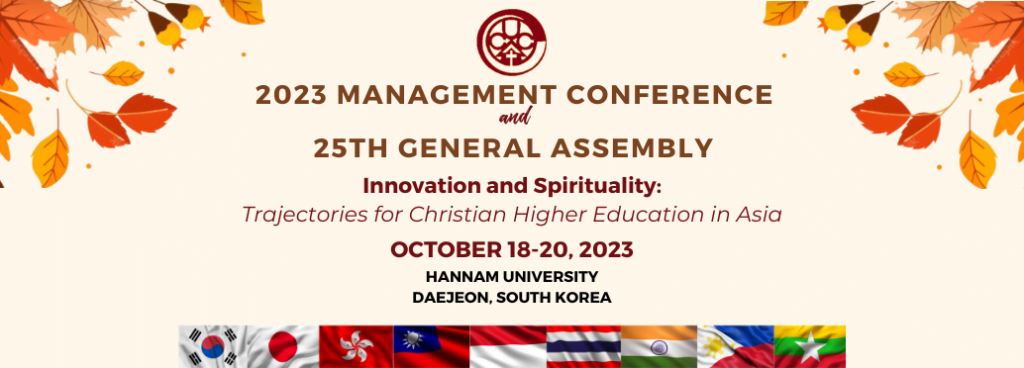
CONCEPT NOTE
The proposed theme for the General Assembly and Management Conference of the Association of Christian Universities and Colleges in Asia (ACUCA) in October 2023 hopes to address the role of Christian Higher Education in Asia in the face of the challenges and issues brought about by the advent of AI or the Fifth Industrial Revolution. In addressing such issues, it is expected that conversations shall include innovations (micro-credentials), inclusivity, excellence, and quality assurance.
The General Assembly and Management Conference can serve as a platform for Christian educators and academics to explore the role of faith-based institutions in shaping a transformative and ethical education landscape amidst the challenges and opportunities of the Fifth Industrial Revolution. By integrating Christian doctrine into higher education, the conference seeks to foster innovative pedagogies, cultivate ethical leadership, promote social justice, and address the ever-evolving needs of students and society.
Theme: Innovation and Spirituality: Trajectories for Christian Higher Education in Asia
Conference Objectives
- To examine the theological foundations that underpin faith-informed education within Christian universities and colleges.
- To discuss strategies for nurturing ethical leadership in faith-based higher education institutions in the context of the Fifth Industrial Revolution.
- To showcase innovative approaches and practices that integrate Christian values and principles into teaching, learning, and research.
- To explore the role of Christian Higher Education Institutions in promoting social justice, equity, and community engagement through education.
- To facilitate networking and collaboration among Christian educators, education practitioners, and academics for mutual learning and growth.
Conference Structure
The conference will consist of plenary sessions, parallel sessions, and networking opportunities. The plenary sessions will focus on the overarching themes of theological foundations, ethical leadership, faith-informed innovation in teaching and learning, and promoting social justice. Renowned speakers and experts in the field will present keynotes and engage in thought-provoking discussions. The parallel sessions will delve deeper into sub-themes such as faith integration across disciplines, innovative pedagogies, ethical use of technology, faith-informed research, student formation and spiritual development, partnerships for social impact, and leadership development in faith-based higher education.
Conference Activities
- Plenary Sessions. Renowned speakers and experts will deliver keynote addresses and engage in panel discussions to provide insights into the theological foundations of faith-informed education, strategies for nurturing ethical leadership, innovative approaches to teaching and learning, and the role of faith-based institutions in promoting social justice and community engagement.
- Parallel Sessions. Engaging sessions will be held on specific topics of interest, bringing together experts and practitioners to explore critical issues and emerging trends in faith-informed education. Participants will have the opportunity to interact with panelists and gain valuable insights.
- Networking Opportunities. The conference will provide ample opportunities for participants to network, collaborate, and establish connections with fellow Christian educators and academics. Networking sessions, social events, and informal gatherings will facilitate meaningful conversations, idea sharing, and potential research collaborations.
Expected Outcomes
- Enhanced understanding of the theological foundations that underpin faith-informed education.
- Strategies and best practices for nurturing ethical leadership in faith-based higher education institutions.
- Insightful discussions on innovative pedagogies that integrate Christian values and principles.
- Practical approaches to promoting social justice, equity, and community engagement through faith-informed education.
- Knowledge sharing and collaboration among Christian educators, practitioners, and academics.
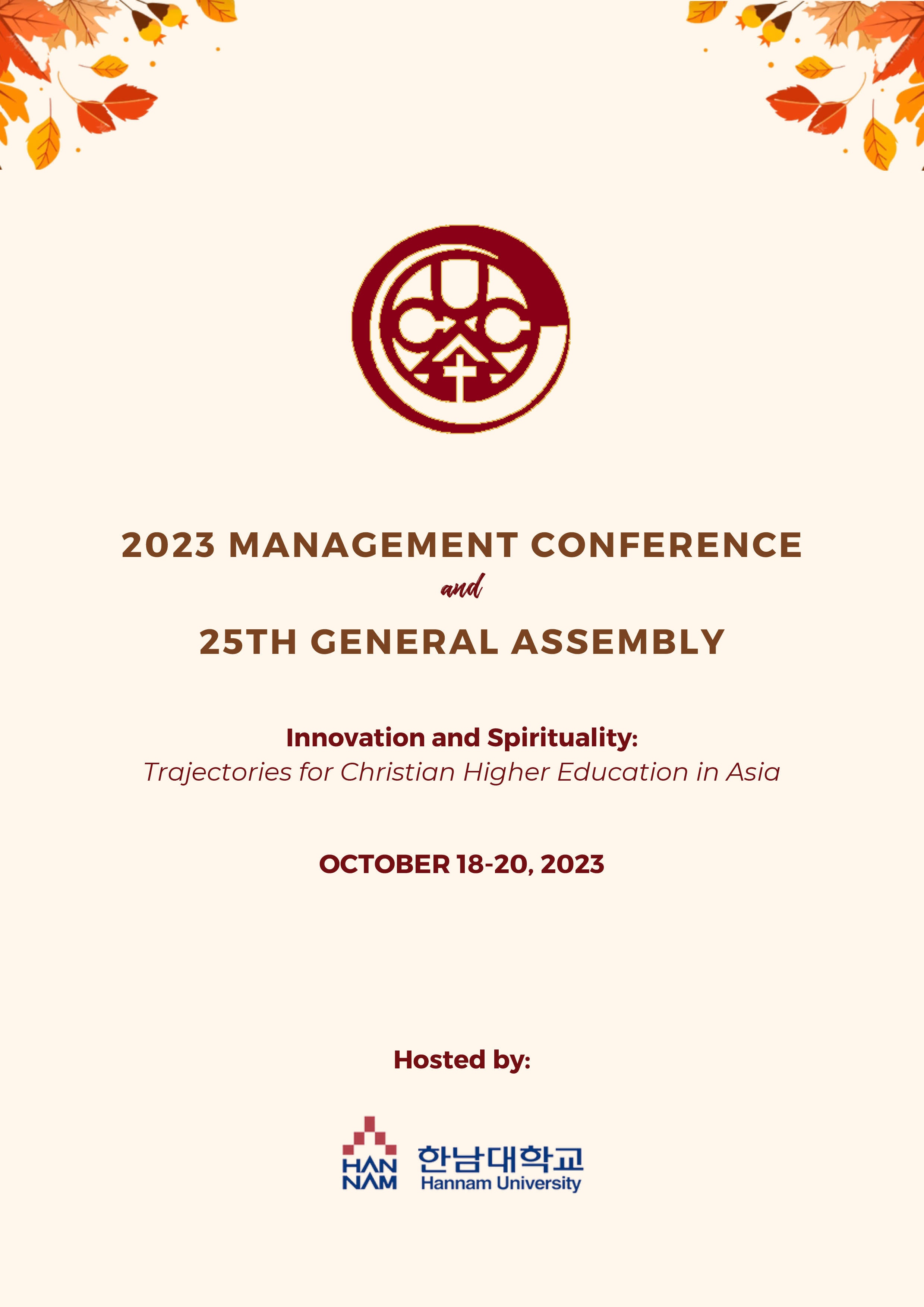
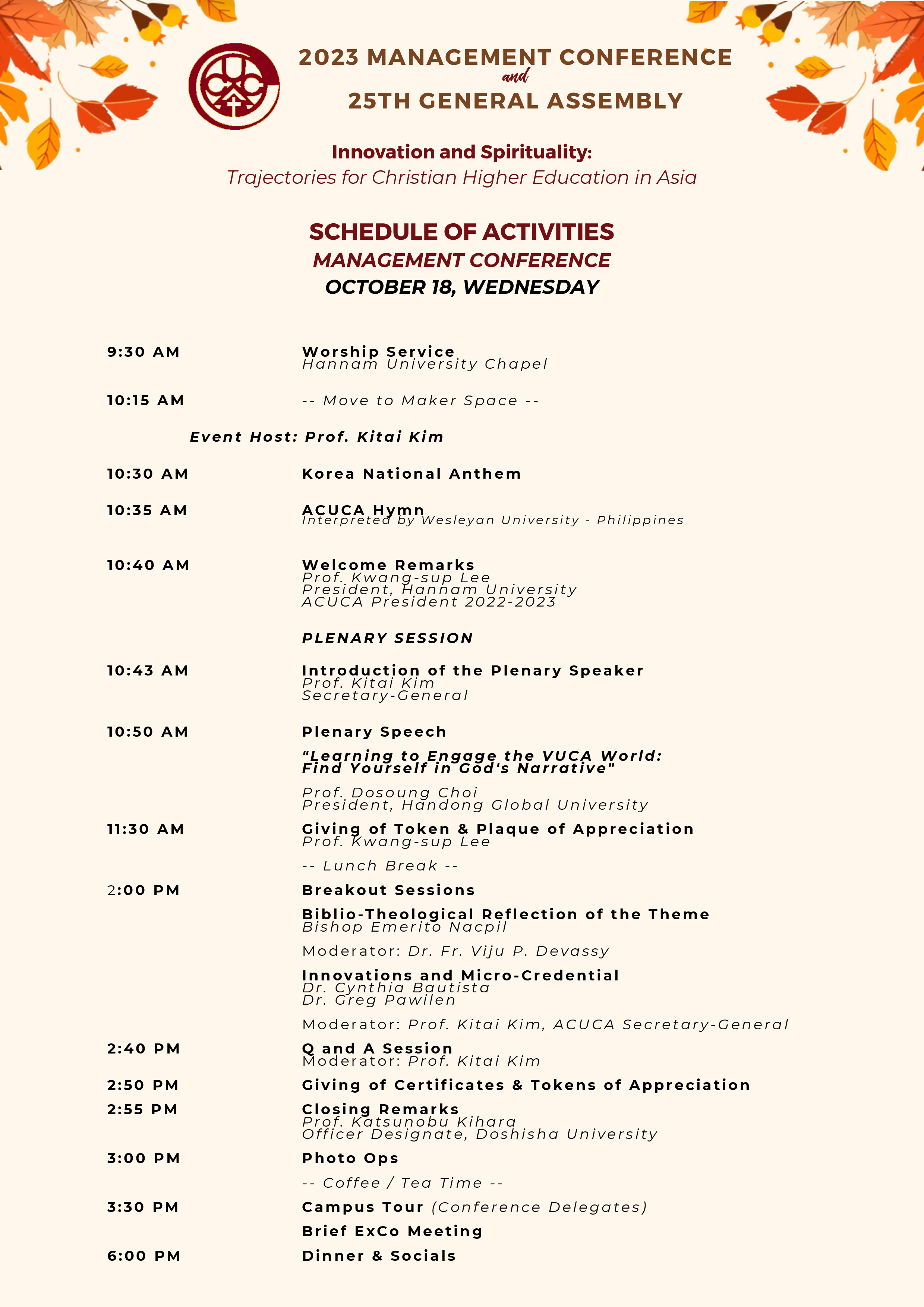
KEYNOTE SPEAKER
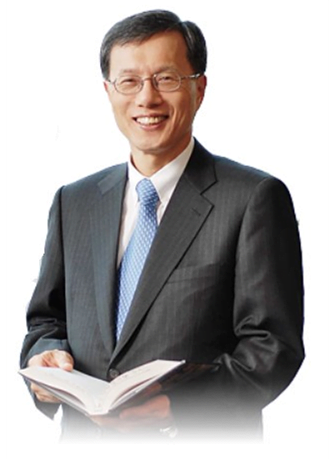
PROF. DOSOUNG CHOI
President
Handong Global University
Education
- B. S. in Business Administration, Seoul National University, (February 1974)
- M. S. in Business Administration, Seoul National University, (February 1976)
- Ph.D. in Business Administration – Finance, Pennsylvania State University (August 1980)
Experience
- Assistant Professor, Pennsylvania State University (1980-1981)
- Assistant Professor, The University of Tennessee (1981-1986)
- Associate Professor, The State University of New York (1986-1994)
- Deputy Director of Bank Management Research Institute, The State University of New York (1989-1996)
- Director and Executive Secretary, Seoul National University Development Fund. (1997-1999)
- Member, Labor-Management Committee’s Special Committee (1998-1999)
- Member, Preparatory Committee of Research Groups in the Prime Minister’s Office (1998-1999)
- External Director, Mirae Asset Securities Co., Ltd. (1982-1986)
- Professor, Seoul National University College of Business (1994-2008)
- Vice Dean and Director of Business Administration, Seoul National University (1999-2001)
- Non-executive Director, Korea National Oil Corporation (1997-2004)
- President, Korean Securities Association (2000-2001)
- Vice President, Korean Venture Association (2001-2002)
- Vice President of the Korean Financial Association (2001-2002)
- Non-executive Member, Securities and Futures Commission (2001-2004)
- Editor-in-chief, Korean Business Association’s “Business Research (Academic Journal)” (2001-2004)
- Chairman, Corporate Governance Improvement Committee and Research Committee (2002-2005)
- Chairman, Post Office Deposit Fund Management Committee, Ministry of Information and Communication (2002-2007)
- Public Interest Director, Korea Securities Industry Association (2004-2005)
- External Director, Woori Financial Group (2004-2005)
- External Director, Korea Stock Exchange (2005)
- Director, Korea Securities Research Institute (2005-2008)
- President, Korean Finance Association (2006)
- Director, Asian Finance Association (2006-2008)
- Member, Asian Shadow Financial Regulatory Committee (2006-2008)
- Chairman, Management Evaluation Committee of the Korea Development Bank subsidiary (2006-2008)
- Monetary Policy Board, The Bank of Korea (2008-2012)
- Vice President of International Affairs, Handong Global University (2012-2014)
- Professor, Graduate School of Global Development & Entrepreneurship, Handong Global University (2012-2014)
- External Director, Hyundai Card Co., Ltd. (2013-2014)
- External Director, Samchully Co., Ltd. (2013-2019)
- Professor of Global Business Administration at Gachon University (2015-2018)
- External Director, POSCO International Co., Ltd. (2015-2019)
- Vice President, International and Graduate School of Business, Gachon University (2016-2017)
- President, Seoul Economist Club (2018-2019)
- Endowed-Chair Professor, School of Business, Gachon University (2018-2022)
- Director of Impact Financial Group Korea (2018-Present)
- President, Handong Global University (2022-Present)
Honors and Awards
- The Best Paper Award, Korean Finance Association (1999)
- The Jeong Jin-ki Award for Media Culture (Management and Economic Book Division) (1999)
- The Best Paper Award, Korean Securities Association (2003)
PARALLEL SPEAKERS
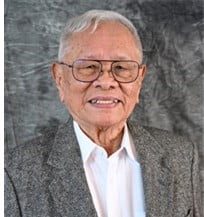
Bishop Emerito P. Nacpil: A Man of Vision and Passion
(Global Leader, Evangelist, Ecumenist, Educator, Author, Philosopher, Theologian)
In the history of United Methodism in the Philippines, Bishop Emerito P. Nacpil stands out, bar none.
Elected to the Episcopacy in 1980, he served as bishop for 20 years until his retirement in the year 2000. Bishop Nacpil awakened and invigorated the Methodist church by strengthening its mission evangelism program. Under his watch, pastors were equipped and trained to be evangelists themselves. Those were the golden years of Methodism in the Philippines, marked by the expansion of Methodist membership, building of new local churches, standardization and stabilization of support for pastors, and church workers through his Self-Reliance Fund program.
Coming from a family of educators and church workers, Bishop Nacpil breathed life on John Wesley’s vision of uniting vital piety and learning. He believes that education is “a growing in and a coming out”, a combining of the secular (learning) with the spiritual (vital piety), leading to the development and formation of mature and educated Christian leaders. A visible realization of this vision was the founding of Wesley Divinity School in Cabanatuan City and Wesleyan College of Manila in the heart of Metro Manila.
His expertise as an educator did not escape the discerning eye of Chairman Emmanuel Y. Angeles of the Commission on Higher Education (CHED). In 2015 Bishop Nacpil was appointed by CHED as a member of the technical panel of the Humanities Education Technical Working Group. He was likewise appointed chair of the Theological Committee Working Group, actively helping and accrediting the programs of theological schools all over the country.
Bishop Nacpil redefined mission evangelism in Asia.
He valiantly fought for the rethinking and reformation of mission in Asia, a challenge that this Asian David posed before the western Goliath in his 1971 address before Methodist missionaries and church leaders. This resulted in the moratorium of missionaries from the West and allowed the churches from Asia to find their own identity and self-hood in mission.
As President of the Union Theological Seminary, Dean of Southeast Asia Graduate School of Theology, and Executive Director of the Association of Theological Schools in Southeast Asia, he displayed remarkable global leadership earning him the respect of his peers and the admiration of church leaders all over the world.
From the perspective of Southeast Asia, Bishop Nacpil made cutting-edge theological contributions at the conferences and consultations held in the Asian region. As Executive Director of the Association of Theological Schools in Southeast Asia, he formed and developed the “Asian Critical Principle,” which up to now is regarded as a fundamental cornerstone in doing theology and mission in the Asian context.
To quote S. Wesley Ariarajah, a scholar and researcher from Boston University of Theology, “Not everyone in the Southeast Asian region who has had thorough orientation in the Western theological tradition has been able to break out of the Western theological mode of thinking to articulate theology from an Asian perspective. When one mentions the pioneers in this respect, Emerito Nacpil will be among the top of the list”.
Confronting pluralism in Christian traditions and theology, Bishop Nacpil smashed to smithereens the impasse, by being an indefatigable ecumenist. Inspired by the spirit of Vatican 2, where he was one of the very few carefully chosen as Vatican 2 observer, Bishop Nacpil opened the lines of communication between and among Catholic and Protestant churches in the Philippines, in Asia, and the whole world.
As Vice-Chair of the Faith and Order Commission, he worked together with Father Joseph Ratzinger, known to the world as Pope Benedict XVI. Working with the best minds, the young Bishop Nacpil, served as staff of the East Asian Christian Conference and became the trusted confidante and secretary to the great world leader in ecumenism and evangelism, D.T. Niles.
Being a member of the Central Committee of the World Council of Churches, Bishop Nacpil left no stone unturned in achieving harmonious ecumenical partnerships, respecting and promoting unity in diversity, thereby preventing further damaging schism of Christian Churches.
In 1997, he earned the distinction of being the only Filipino and the only Asian to be elected and installed as president of the United Methodist Council of Bishops. Our hearts swelled with pride when in May 2000, he was chosen to deliver the Episcopal address during the 2000 General Conference, the first non-American bishop selected for the task.
Even in retirement, Bishop Nacpil posited a nascent theological vision in his magnum opus, the 5-volume book on A Spirituality that Secularizes. In a sphere dominated Western thought, Bishop Nacpil forayed into traditional exegesis engaging and provoking his readers to come to terms with tacit postulations and interpretation of the Scripture, bringing into light a unique understanding of the secularizing activity of the Spirit in the world.
As a prolific thinker and writer, Bishop Nacpil is listed in the WorldCat Identities network, where his 23 works (books, articles, treatises) in 54 publications, are held by 925 library holdings all over the world.
A man of peace and unwavering passion for the cause of peacefully making peace, Bishop Nacpil reached out to people, transcending cultural and racial boundaries serving as Chairperson of the Peacefully- Making Peace Committee of the Asia Pacific Association of Methodist-related Educational Institutions, and as consultant to the Interfaith Committee of the Global Peace Foundation.
A world-class bishop with a great mind and a compassionate heart, in the words of Retired Chief Justice Reynato Puno, “Bishop Nacpil targeted the transposition of our church from a passive church to an active church in the matter of contributing inputs on the burning social, economic, political and religious problems confronting our people,”
A distinguished intellectual giant with exemplary Christian stewardship, admirable courage and honesty, indisputable integrity, and probity who steered the course of Wesleyan education and Methodist tradition all over the world to greater heights, inspiring and making us all truly proud of this humble man of vision and passion, BISHOP EMERITO P. NACPIL!
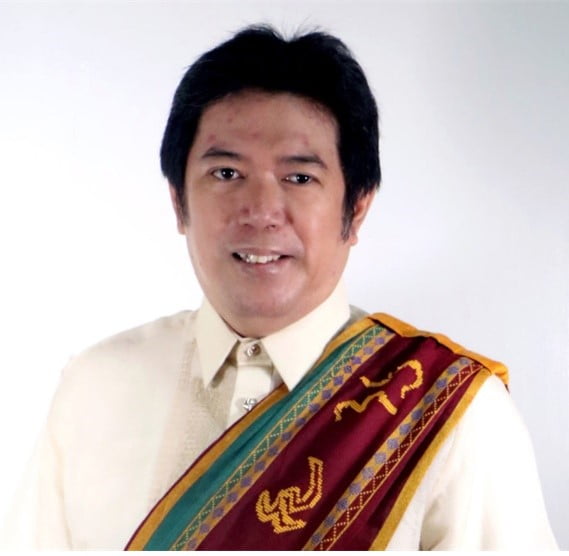
Greg Tabios Pawilen, Ph.D.
Director
Office for Institutional Development in Higher Education University of the Philippines – Los Baños
Dr. Greg Tabios Pawilen is a well-known curriculum expert in the Philippines with many pioneering works and innovations, including the curriculum for the gifted, transition program for learners with special needs, inclusive education, redesigned Kindergarten curriculum, the SIKAp curriculum, special program for foreign language in the Philippines, gender in the curriculum, indigenization, localization and contextualization of the curriculum, and many others. For six years, he was a member of the Philippine Commission on Higher Education’s technical committee where he checked and reviewed all curricula from Kindergarten to graduate programs. He was the lead trainer of Outcomes-Based Education who trained hundreds of HEIs in the country. During the pandemic, to advance flexible learning, he trained 1,723 out of 2,017 HEIs across all fields. He is the first Director of the University of the Philippines Los Baños’ Office for Institutional Development in Higher Education which helps build the capacity of State and Local Universities and Colleges through technical assistance in curriculum development, collaborative research, faculty development, and leadership development.
He earned his Doctor of Philosophy in Education – Curriculum Studies from the University of the Philippines; his Master of Education – Curriculum Development in Science Education from Ehime University, Matsuyama City, Japan; and his Master of Arts in Education – Curriculum Studies from the University of the Philippines. He was also granted a Post-Doctoral Follow-up Research Fellowship as Researcher on Developing Curriculum Standards for Gifted Students in Elementary Science by the Japan Student Support Organization.
He is the Vice Chairperson of the University Senate of the United Methodist Church in the Philippines from 2018 to present. He developed the 10-year curriculum plan for the Vacation Church School of the National Council of Churches in the Philippines. He is the founding adviser of the Methodist Movement in the University of the Philippines’ main campus. In the years when he was in the United Methodist Youth Fellowship, he was a member of the Coordinating Council of the UMC representing the Baguio Episcopal Area. He was the Vice President of the North West Philippines Annual Conference for 9 years. He led the materials development of the youth program of the NUMYFP and strengthened the Continuing Education Program and Professional Development of the Diakonia Philippines. He proposed the typology of seminaries of the UMC and created the development plan for Methodist HEIs.
Dr. Greg is a renowned publisher of academic articles and chapters in reputable journals and publications, he has volumes of books that he either wrote or supervised the writing of. He is a resource person on various topics and has received numerous citations and awards. He is a consultant for schools, private organizations, and government agencies particularly the Department of Education.
HOST
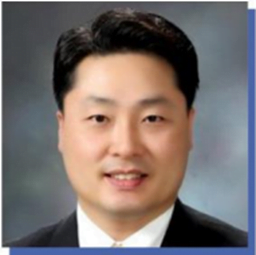
PROF. KITAI KIM
Secretary General
Dr. Kitai Kim is Professor of Global Media & Culture at the Linton Global School of Hannam University. Professor Kim received his BA and MS degrees from Virginia Commonwealth University and his PhD from Chungbuk National University in South Korea. At Hannam University, he served as Director of the Linton Global College, Director of the Foreign Language Education Center, and Officer Designate of Hannam University to the Association of Christian Universities and Colleges in Asia (ACUCA) and the Association of Presbyterian Colleges & Universities (APCU) in the United States. Professor Kim currently serves as the Associate Dean of Global Relations and Chair of the Department of Global Media & Culture.
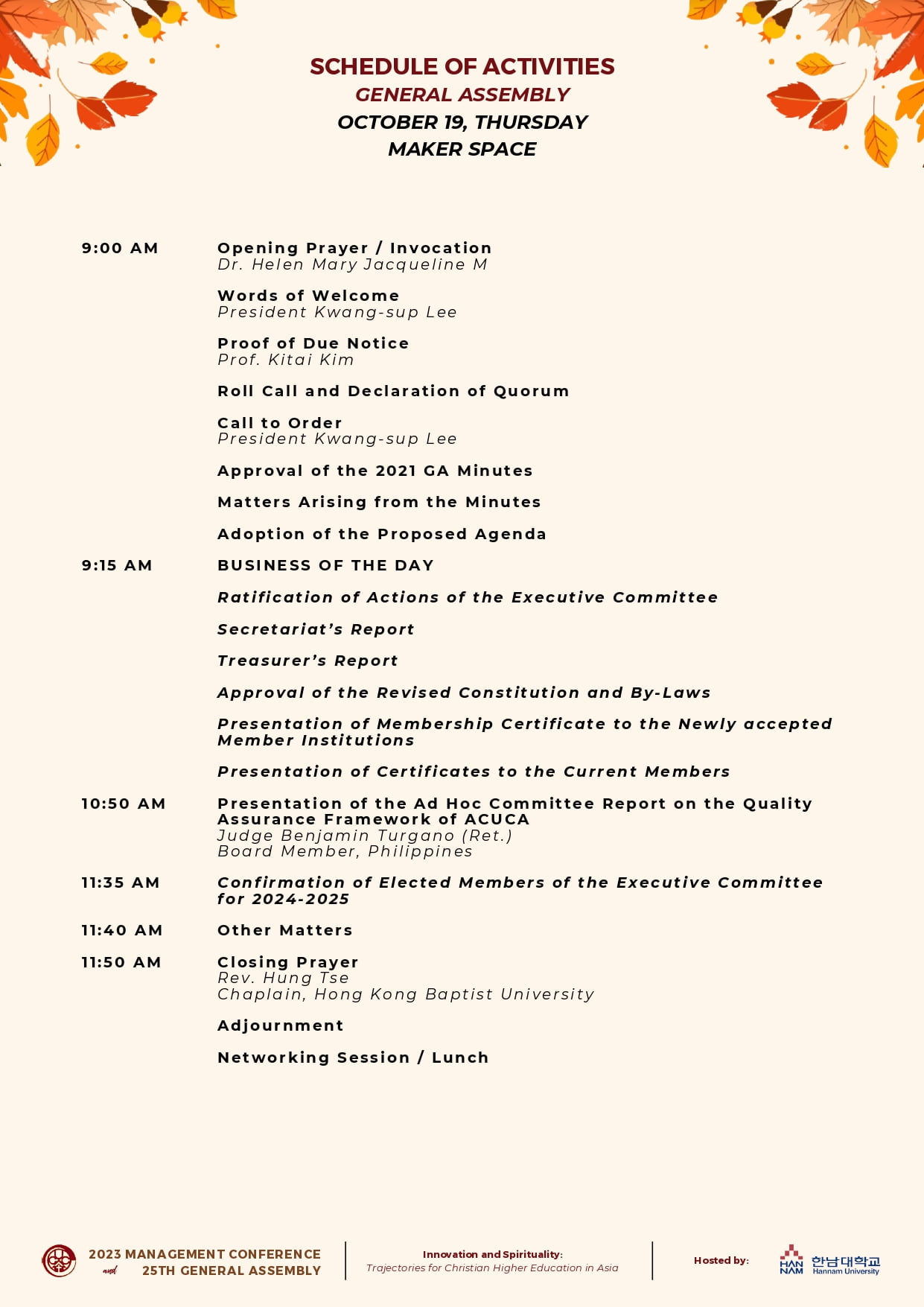
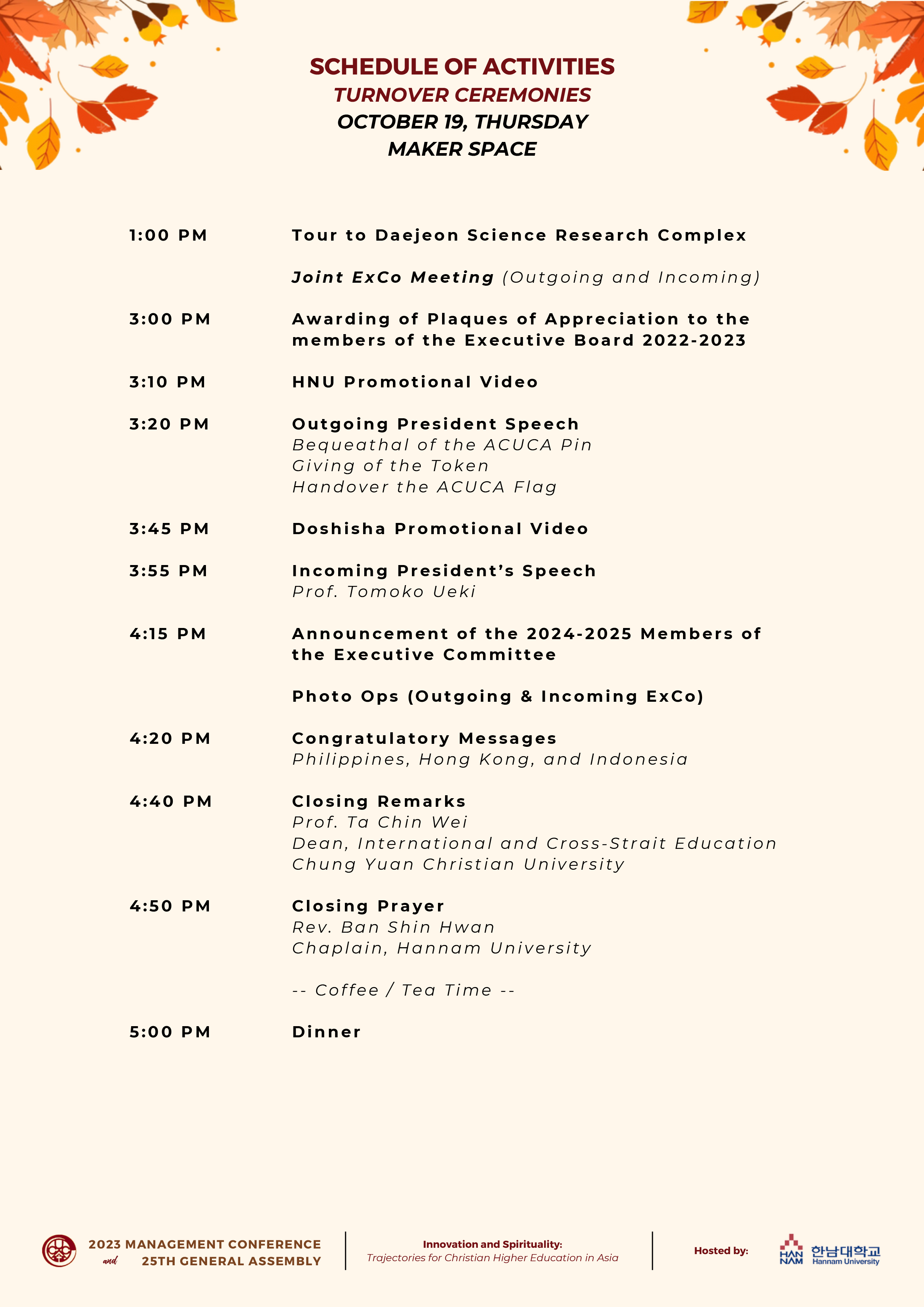
Lorem ipsum dolor sit amet, consectetur adipiscing elit. Ut elit tellus, luctus nec ullamcorper mattis, pulvinar dapibus leo.
